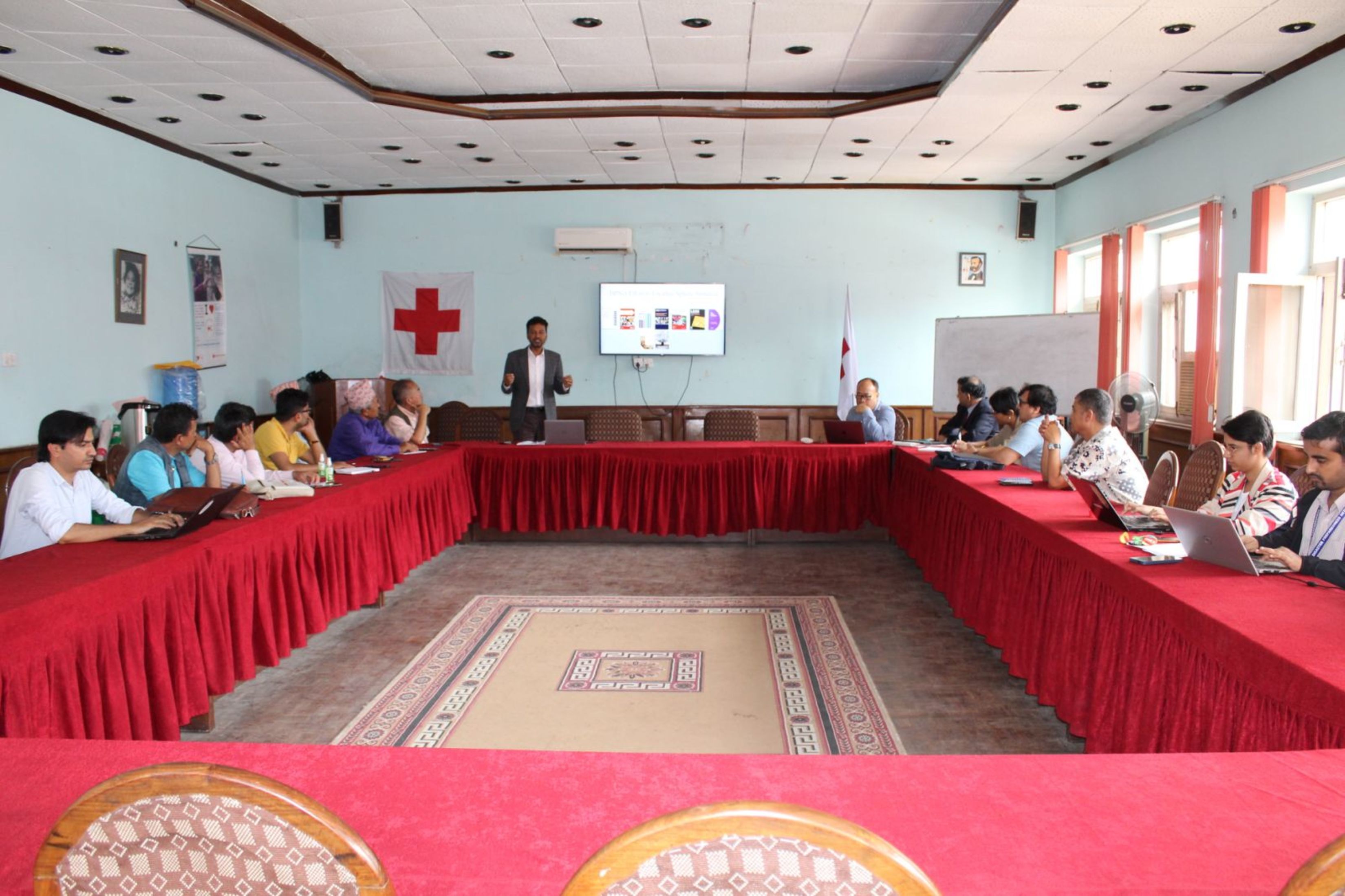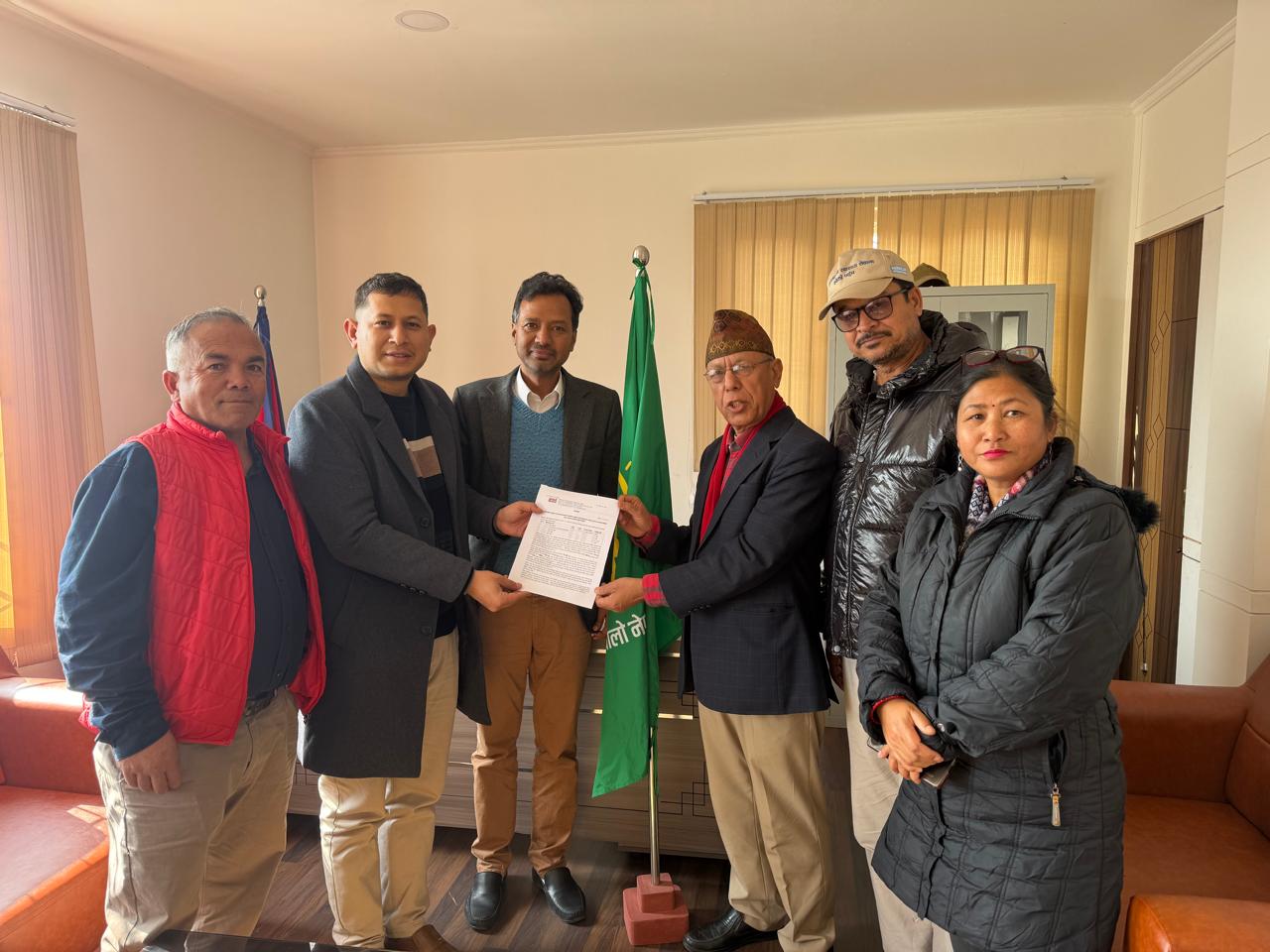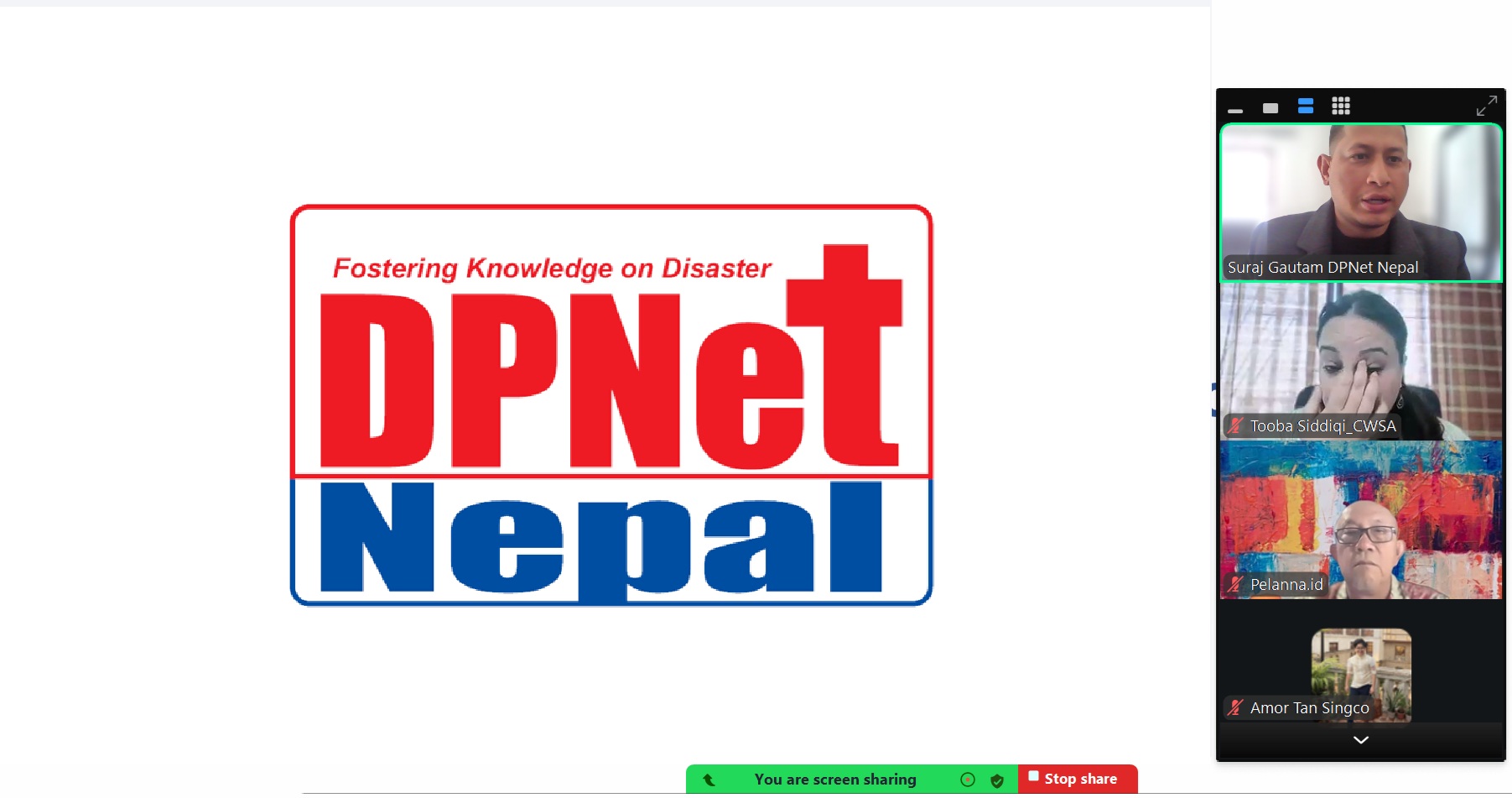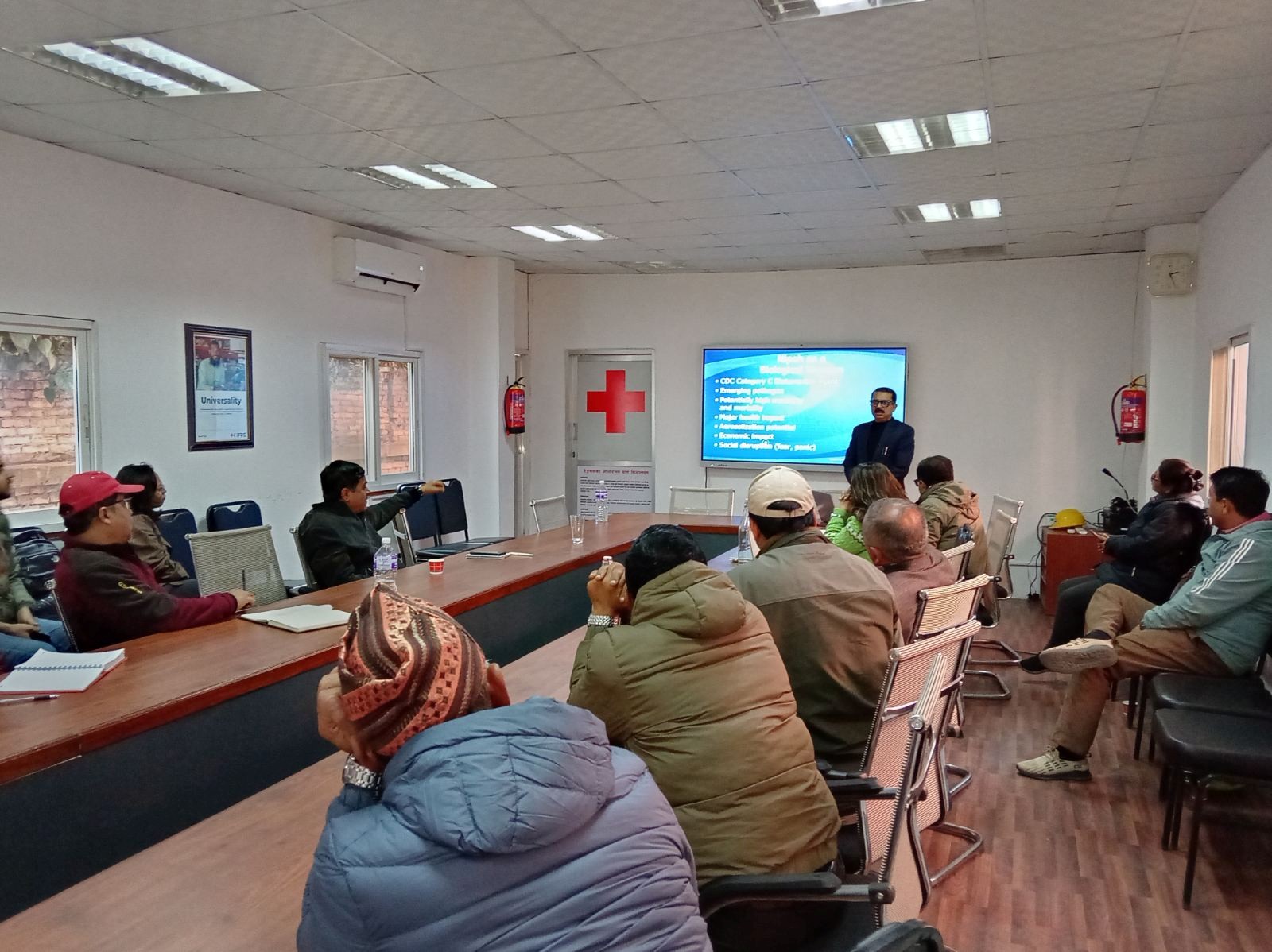Discussion Program on SEADS Standard

August 18, 2023- DPNet Nepal organized a significant discussion session on SEADS (Standards for Effective Agricultural Disaster Response) standards in collaboration with SEADS expert from the USA, Dr. Suresh Babu. Dr. Raju Thapa, Acting Chair of DPNet Nepal chaired the program, which was attended by distinguished guests with a long history of working in agriculture, crops, and farmer related field such as Mr. Nabaraj Basnet, Chair at National Federation of Farmers Group (NFGN), Mr. Chhabi Paudel, Advisor at NFGN, Mr. Niranjan Pudasaini, Senior Program Officer at LI-BIRD, other notable members from Nepal Redcross Society, World Bank, Institute for Integrated Development Studies (IIDS).
The technical session started with a presentation on “DPNet Effort to Localize Sphere Standard” by Dr. Raju Thapa. Dr. Thapa commenced the program with a brief introduction to the SEADS Standard for crops along with the program goals, objectives, and the expected outcomes of the interaction with the SEADS experts. He emphasized the fact that the Sphere standards are a set of principles and minimum humanitarian standards in four technical areas of humanitarian response: Water supply, sanitation, and hygiene promotion (WASH) Food security, and nutrition. He shared with the floor the fact that DPNet serves as the secretariat of NPDRR following a holistic approach involving all segments of society, operating through 9 thematic groups. DPNet holds the position of being the focal point for Sphere Geneva in Nepal and is responsible for localizing and institutionalizing Sphere standards. Therefore, DPNet has made remarkable efforts to reach all Local Governments of Nepal on Sphere Standard through 753 DRR Localization trainings.
Dr. Thapa shared that to ensure the localization of Sphere and its other eight companion standards, DPNet has been conducting various programs and already translated companion standards related to inclusion, market recovery, economic analysis, and education standards in Nepali. In regard to this, the SEADS standard, on crop-related livelihoods to mitigate food and agriculture-related risks during emergencies.
In his presentation, Mr. Niranjan Pudasaini, Senior Program Officer at LI-BIRD, introduced the organization and its local initiatives, focusing on agriculture within the context of disasters with seeds at the core. He highlighted the 5 core principles of SEADS Standards and underscored Nepal's heavy reliance on traditional crop landraces while emphasizing that over 75% of farm households obtain seeds from informal sources, and the formal seed system contributes less than 22% to national demand. Mr. Pudasaini emphasized the deteriorating local seed system due to socio-economic changes and linked it to the increasing trend of disaster events since 2000. Recurring hazards include fire, landslides, thunderbolts, heavy rainfall, floods, and windstorms, which became more pronounced in 2015. He highlighted the challenges faced by smallholder farmers during disasters, emphasizing issues related to seed quality, availability, affordability, and resilience efforts. Mr. Pudasaini outlined LI-BIRD's initiatives, including quick relief, earthquake recovery, and flood resilience projects, and highlighted the role of Community Seed Banks (CSBs) in enhancing local seed systems and overall resilience, emphasizing their five core functions.
Dr. Suresh Babu, a Senior Research Fellow and Head of Capacity Building at the International Food Policy Research Institute (IFPRI), delivered a presentation titled “Socializing Crop Emergency Guidelines and Interventions for Climate-Smart Agriculture”. His presentation aimed to discuss the integration of guidelines for crop emergencies and interventions in the context of climate-smart agriculture. The broad objectives included contributing to result-based management through provincial capacity investment, addressing emergencies, building resilience, and promoting long-term development. The importance of involving various stakeholders, such as governments, international organizations, civil society, and the private sector, in disaster management and resilience-building was emphasized, especially given the impact of crises on reduced food production and livelihoods. Dr. Babu focused on the use of SEADS and Livestock Emergency Guidelines and Standards (LEGS) manuals, as well as Humanitarian Standards, to design programmatic actions at the national and provincial levels. The approach involved strengthening policy and institutional systems, conducting needs assessments, mapping evidence, and applying guidelines through case studies and consultations. This was achieved through the implementation of a seeds manual, engaging multiple stakeholders, and promoting crop-based innovations. An illustrative example he gave was the ‘El Nino’ drought of 1992, which underscored the need for adaptive strategies to mitigate crop losses caused by extreme events such as disasters. Dr. Babu highlighted the importance of integrating climate-resilient practices in emergency interventions in the localization process with an understanding of the nature of disaster, and what has already been in practice in the provincial level as a preparedness and response to achieve long-term development and climate-smart agriculture. He concluded the presentation with a call to revisit existing guidelines, promote multi-sectoral actions at various administrative levels, and emphasize the use of SEADS for planning, scaling up, and fostering climate-resilient agriculture.
Mr. Jib Nath Sharma from Care Nepal emphasized the need for aligning crop practices with SEADS standards Nepal faces contradictions with prevailing customs, including increasing seed replacement, establishing local seed banks, legal conflicts over rights, and the need to address reusing leftover grains for seeds.
Mr. Chhabi Paudel, Advisor, NFGN stressed the fact that managing Nepal's diverse ecosystems in disaster scenarios is complex. Escalating climatic disasters in areas like Jumla and Mustang emphasized the need for responsive strategies. To blend SEADS standards with traditional contingency farming, preserving indigenous practices becomes vital, requiring a careful balance between modern standards and local wisdom.
Mr. Nabaraj Basnet, Chair at NFGN explained the provision of Food Sovereignty in the constitution as the right of people to healthy and culturally appropriate food produced through ecologically sound and sustainable methods, and their right to define their own food and agriculture systems. So, he emphasized the protection of indigenous technology and local crops while maintaining the crop standard. Mr. Basnet was glad to be sensitized about SPHERE and other companion standards. He stressed the capacity development and awareness among farmers for using such standards in practice.
Mr. Sher Bahadur Karki of the Nepal Red Cross Society emphasized the extinction of local seeds. He highlighted the serious issue that the capturing of land has necessitated an increase in production, which in turn has led to the heightened use of hybrid seeds. As a result, he suggested that intervention in this matter is necessary.
Mr. Panchakaji Shrestha, Vice Chair at NFGN, highlighted the necessity for awareness concerning seeds and the importance of preserving them using indigenous methods. He emphasized the need for greater emphasis on preserving seeds in an indigenous manner.
Ms. Anita Basnet explained that there had been a decrease in soil quality, and the absence of a seed bank had posed a challenge in preserving seeds at the community level. She expressed readiness for collaboration from the farmers’ side.
Mr. Ram Gurung, Technical advisor at DPNet Nepal questioned the feasibility of simplifying the SEADS Standard's conceptual framework to ensure community members can effectively understand the manual guidelines. This simplification aims for successful localization and implementation. Mr. Gurung emphasized that the SEADS standards were initially developed with a global perspective, which might not perfectly align with local contexts. He stressed the importance of customizing these standards to match the specific conditions of the region. Mr. Gurung introduced SEADS as a concept that revolves around seeds within the context of disaster management. Mr. Gurung further clarified the fundamental essence and objectives of the SEADS Standard, with a specific focus on aspects related to infrastructures, tools, crops, and agriculture. He underlined the environmental advantages of using local seeds, highlighting their natural and eco-friendly qualities. However, he also noted the rising preference for hybrid seeds, which has resulted in consequences for the agricultural sector and implications for farmers.
Dr. Raju Thapa, Program Chair highlighted the importance of the SEADS standard and the need for mainstreaming it in DRRM. Dr. Thapa shared the steps for a successful implementation of SEADS standards that involve precise translation, consultation, well-structured training, and creative engagement strategies to effectively communicate and apply the standards within the community. He clarified the fact that DPNet Nepal is competent and interested enough to work as a focal point with different stakeholders for the effective implementation of the SEADS Standard and its localization. He concluded the session by expressing his gratitude to all the participants present at the event.











